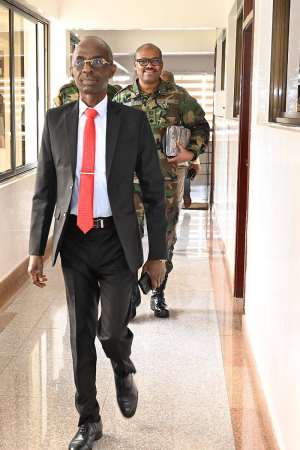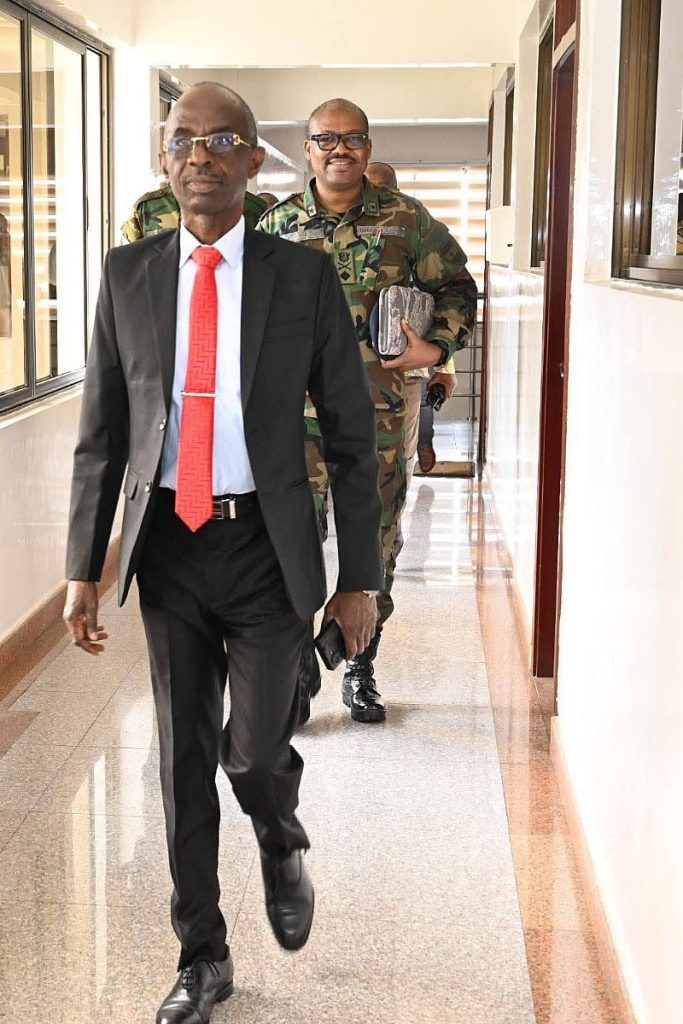 Chairman General
Chairman GeneralAs Africa’s trade routes reshape, Ghana entrusts a political veteran with a nation’s busiest ports.
“This is not just about shipping lanes—it’s about sovereign strategy. Ghana must now lead with ports that are efficient, ethical, and economically empowering.”
Bismarck Kwesi Davis
Accra, Ghana
— At exactly 10:43 a.m. on Wednesday, June 25, 2025, Johnson Asiedu Nketiah adjusted his glasses, rose from his seat, and took the oath that would place Ghana’s entire maritime economy under his supervision. The man known across political aisles as “General Mosquito” — sharp-tongued, seasoned, and unswervingly strategic — was now the Board Chair of the Ghana Ports and Harbours Authority (GPHA).
This wasn’t just ceremony. It was symbolism. A former banker and lifelong political tactician is now at the helm of an institution that oversees over 85 percent of Ghana’s international trade. The ports of Tema and Takoradi, long plagued by delays, inefficiencies, and revenue leakages, now fall under the stewardship of a man whose entire career has revolved around strategic endurance.
From Parliament to the Port
Born in the Bono Region’s Seikwa township, Asiedu Nketiah’s political evolution is Ghanaian history in motion — MP, Deputy Minister, General Secretary, and now National Chairman of the opposition National Democratic Congress (NDC). But beneath the public rhetoric lies a mind sculpted by economics and refined by decades of statecraft.
His entry into the ports — a realm governed by logistics, tariffs, and transcontinental trade — may seem unconventional. But insiders say this is exactly the bold departure Ghana needs.
“We are not just moving containers. We are moving the future of Ghana’s economy,” Nketiah said, moments after the swearing-in. “And we will do so with integrity, urgency, and innovation.”
Ghana’s Gateway to Global Commerce
The stakes could not be higher. Ghana’s ports are critical nodes in West Africa’s trade ecosystem, handling cargo for landlocked nations like Burkina Faso, Mali, and Niger. But inefficiencies at Tema and Takoradi have long stifled potential. Port congestion, fluctuating tariffs, and manual processing have deterred investors and exporters alike.
A 2024 audit revealed that port inefficiencies cost Ghana approximately $200 million annually in lost revenue and delayed shipments.
But with the African Continental Free Trade Area (AfCFTA) now headquartered in Accra, Ghana stands poised to become a regional trade juggernaut — if the right reforms are executed.
From Partisan Pitbull to Maritime Moderator?
For many Ghanaians, Nketiah’s appointment evokes mixed feelings. His legacy in political battlefields is undisputed — but can the same firebrand transform Ghana’s ports into models of 21st-century governance?
His close ties to the NDC raise questions about political neutrality at an institution that should serve the state, not a party. Yet others see opportunity.
“Ports are the arteries of national revenue,” said Dr. Ama Ofori-Atta, a maritime governance expert. “If Nketiah succeeds, it won’t just be a political win. It will be a generational game-changer.”
The Road Ahead: Reforms, Risks, and Regional Ambitions
As chair, Asiedu Nketiah is expected to oversee a series of reforms:
Digitization of port operations Public-private infrastructure partnerships Customs modernization Maritime security enhancement Green port initiatives to combat climate risks
Already, murmurs from within the shipping community suggest cautious optimism. Freight companies, long burdened by red tape, are calling for predictable tariff structures and swift cargo processing — both key pillars of the incoming reform blueprint.
A Nation on the Dock
In a country where politics often eclipses statecraft, Johnson Asiedu Nketiah stands as a rare exception—an enduring figure whose public life embodies both the strategic intelligence of a political tactician and the institutional clarity of a nation-builder.
As Board Chairman of the Ghana Ports and Harbours Authority, his current assignment marks not only a new chapter of responsibility but also a strategic turning point for Ghana’s trade, logistics, and economic governance landscape. Ports are more than cement and cranes. They are national theatres of trust, where trade meets technology, and policy meets people.Ghana’s decision to place one of its fiercest political actors at this strategic junction speaks to a broader reality: In the new Ghana, leadership must deliver beyond partisanship.
Asiedu Nketiah now stands not at a podium, but at the gates of a $15 billion trade corridor. What he builds — or fails to build — could determine Ghana’s place in Africa’s economic future.
✍️ Bismarck Kwesi Davis | Resetting Ghana Series


